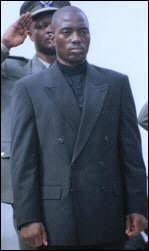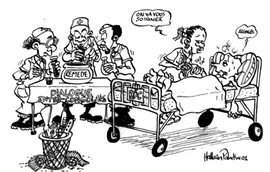 DEMOCRATIC REPUBLIC OF CONGO: PAVING THE RECONSTRUCTION DEMOCRATIC REPUBLIC OF CONGO: PAVING THE RECONSTRUCTION |

April 14th, 2001, will be a date to remember in the history of the Democratic Republic of Congo (DRC) as Joseph Kabila was inaugurated as the new President. Straightaway, he went to business, and thankfully for Congo he meant serious business. Molding his new government, Mr. Kabila clearly chose for experience with most members having a professional background in the major international institutions. In previous times, Congo had imperceptive and unfortunate economic policies, to say the least. Congolese traders were routinely forced by Laurent Kabila's (Joseph Kabila's assassinated father) regime to sell at prices below costs, and investors drawn in under false incentive pretences saw themselves double-crossed with contracts torn to pieces overnight. The importance of the incoming administration's technocratic experience should surely come to good use when facing the daunting task of recovering an economy that suffered a cumulative inflation of 511.6%, and an exchange rate that was a mere 340 Congolese francs to 1 USD. For the past three years, the DRC's GDP noted a 5% slump, and only last year per capita income shrank from USD 224 to less than USD 85.
Mr. Kabila knew that for his administration ever to be able to implement any initiative aimed at the recovery of the DRC's economy, winning the international community's sympathy simply would not do. For the DRC's new program for economic recovery to receive the necessary financial backing, he would have to prove his legitimacy both in national and international arenas. To this end, Mr. Kabila met with international political heavyweights of the likes of President Bush, Jacques Chirac, Tony Blair, and the king of Belgium, all of whom unanimously promised their support for the peace process and the democratization of the DRC. "We will help the Democratic Republic of Congo because helping this country means helping the whole of Africa", British Prime Minister's statement promised solemnly. His commitment echoes the international community's new state of mind in respect of Congo's predicaments. Mr. Kabila therewith received the backing he was looking for to set up credible institutions that would allow him to face the numerous challenges lying ahead.
The main task of the Government was to define its priorities and to stabilize macro-economic fluctuations. This latter step in particular was essential to restart the cooperation with Bretton-Woods institutions and international donors.
To this end, the Government's Reinforced Interim Program established certain objectives, which were primarily budgetary and monetary. The budget is currently in surplus, and monetary growth restricted, while the exchange rate has been taken into floatation. The inflation target is 68,7% for the end of 2001, as compared to 551% in 2000, all of which contributes to breaking the inflationary spiral and the restoration of parity between the official and black exchange rates. Furthermore, the Inter-ministerial Economic Committee's decision-making power was reinforced, and laws regulating the independence of the Central Bank were introduced.
According to Mr. Freddy Matungulu, Minister of Finance, Economy and Budget, and one of the driving forces behind the reform, these measures are considered today healthy and irreversible. According to Mr. Matungulu, the unsatisfactory performances in what should have been very productive sectors resulted from 32 years of dictatorship and three years of uncertainty under Laurent Désiré Kabila - the man who ousted Mobutu. The leather industry, for instance, fell from more than 400,000 tons/year to 30,000 tons/year. Production of gold dropped from 2,000 tons to 100 tons. Moreover, important revenue sources, such as coffee, wood, rubber, cement and drinking water, have experienced dramatic declines in production. | 
According to the Ministry of Finance, this situation could not last, which is why the Ministry asked the Congolese to tighten their belts. "We must go through these difficult moments making sacrifices and accepting the consequences. I am not going to present a theoretical scheme, but rather solutions that have been implemented in other places and that produced results."
The measures did not take long to come to effect. In fact, the exchange rate's relative stability led to a stabilization of prices of goods and services. Though an exponential increase of prices was expected as a result of the adjustment of the official exchange rate, only little did actually happen. Still, because the official rate multiplied by six, reasons to be optimistic abound.
However, this apparent stability of the Democratic Republic of Congo cannot last unless a durable peace has been assured. This very much depends on the so-called Inter-Congolese Dialogue, a political forum of all the Congolese sons and daughters aimed at exposing and debating the differences between them. Within this preparatory framework, between 20-25 of August 2001, a Pre-Dialogue took place in Gaborone (Botswana). Even though it was only a preparatory meeting, it set the spiritual foundation of the Dialogue.
Both the Congolese in armed and unarmed opposition, as well as the Government, were unanimous about the need for a final pursuit for peace and integrity in the DRC. At first, the uneasiness that strained relations between the different parties could be blamed on a lack of legitimacy of Mr. Kabila and his administration. However, no real opposition came forward challenging Mr. Kabila as his government was given respite. The Gaborone encounter took place in a previously unseen spirit of converging views among the different conflicting parties. In the spirit of Gaborone, a momentous Inter-Congolese Dialogue meeting was scheduled on October 15th 2001 in Addis-Ababa. Sir Ketumile Masire, ex-President of Botswana and facilitator of the Dialogue, described this groundwork as very productive. "Expectations are high in view of the success of the National Dialogue. As long as the same spirit of mutual respect, friendship and determination to see the accomplishment of the Inter-Congolese Dialogue prevails, I am convinced that the Inter-Congolese Dialogue will successfully come through. The most important thing is that this groundwork can move forward".
After his European-American tour, Mr. Joseph Kabila's intention was to find out about Congolese living conditions. In June 2001, he therefore started an unprecedented tour around the country. The people of Low-Congo, Bandundu and the two Kasaï (provinces under control of the Government) were indeed surprised to see a young president coming out asking them about their problems. During his tour, Mr. Kabila gained awareness of Congolese's grievances, for example, in respect of the profound deterioration of pathways. This deterioration of infrastructure subsequently prevented agricultural products to reach the cities forcing traditional family business to close down.
|

